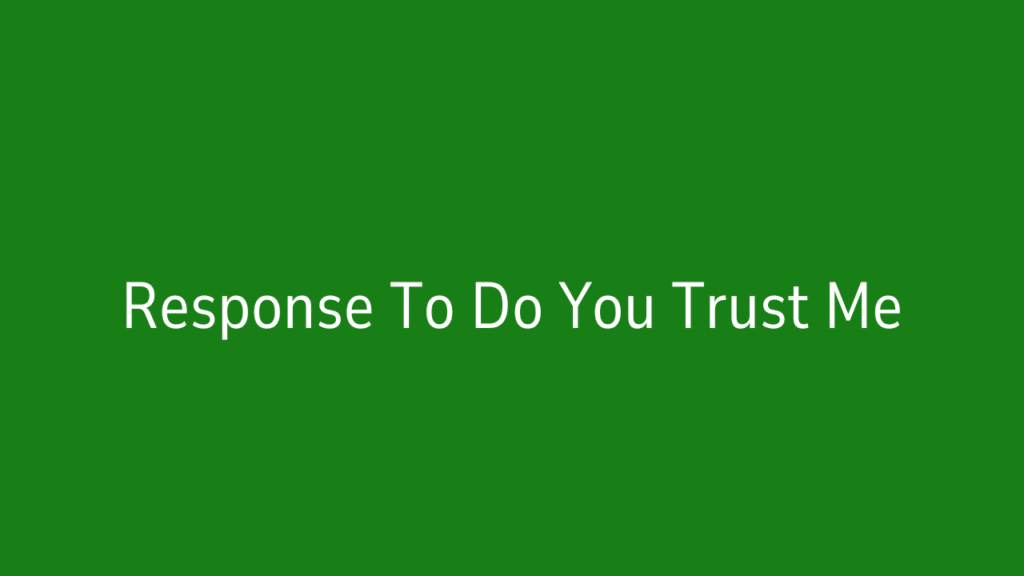Trust is an essential part of any relationship—whether with a partner, family member, friend, or colleague. It’s the foundation that supports all interactions, and its absence can cause uncertainty and insecurity. But when someone asks, “Do you trust me?” the response can vary depending on the situation and the depth of the relationship. Understanding how to respond to this question, while considering what trust means, is vital for navigating relationships effectively.
In this article, we’ll explore different types of responses to “Do you trust me?”, why trust matters, and how to build and maintain trust in relationships. We’ll also take a closer look at how trust can be rebuilt after it’s been broken. Let’s dive in!
What Is Trust?
Trust is much more than just a word we use to describe our feelings for others. It’s a fundamental component of every meaningful relationship. Trust is about belief in another person’s character, reliability, integrity, and abilities. It’s the assurance that someone will act in your best interest and won’t betray your confidence. Trust builds over time, but it can also be shattered in an instant. Let’s take a closer look at the key elements that make up trust:
Key Elements of Trust
- Reliability – Can you depend on the person to follow through on their promises?
- Honesty – Does the person tell the truth, even when it’s difficult?
- Vulnerability – Are you able to share your fears, hopes, and feelings with someone, knowing they won’t judge or exploit your openness?
- Consistency – Is the person reliable over time, with no sudden changes in behavior that make you question their intentions?
- Integrity – Does the person consistently do the right thing, even when nobody is watching?
These elements serve as the pillars of trust, supporting the emotional and practical aspects of our relationships. When these aspects are present, trust grows naturally. Without them, relationships become unstable, and the foundation begins to crack.
How To Respond When Asked, “Do You Trust Me?”
When someone asks, “Do you trust me?” the way you respond will depend on a variety of factors, including the nature of your relationship, past experiences, and where you currently stand with the person. Here’s a breakdown of different ways you can respond, depending on how you feel:
1. Affirmative Responses
If you genuinely trust the person, you’ll give an honest and heartfelt affirmation. These responses are ideal when the relationship is healthy, and you feel confident in the other person’s integrity and character.
- “Yes, I trust you completely.”
- This is a straightforward answer that conveys full confidence. It shows that you believe the person has always acted in your best interest, and it strengthens the bond between you.
- “I trust you with all my heart.”
- This is a deep and emotional response that conveys a high level of intimacy and emotional commitment. It indicates not just trust in someone’s actions but also in their heart and intentions.
- “I trust you, no matter what.”
- This response communicates unwavering faith in the person. It’s a powerful statement of loyalty, often found in romantic or long-term relationships where there’s a deep emotional investment.
- “Yes, I have complete faith in you.”
- This response emphasizes not just trust but also belief in the other person’s character and abilities. It’s ideal for both personal and professional relationships.
- “I trust you fully and without hesitation.”
- This indicates a confident response, showing that there’s no doubt in your mind about the person’s reliability and honesty.
- “Absolutely, I trust you more than anyone else.”
- This response highlights the special place the person holds in your life, showing that you have complete confidence in them, even more than others.
- “I do, and that means a lot to me.”
- This answer shows that trust is important to you, and your acknowledgment reinforces the bond. It’s a positive response with emotional depth.
- “Of course, I do. I believe in you.”
- A simple but strong affirmation, showing that you’re not just trusting their actions but also expressing your belief in their potential and integrity.
- “I trust you with everything I am.”
- This conveys that you trust them not just with actions but with your personal thoughts, feelings, and vulnerability.
- “Yes, I trust you completely because I’ve seen you prove it.”
- This response acknowledges that trust has been built over time and through actions, showing that it’s been earned rather than given automatically.
2. Cautious Responses
If you’re unsure about the level of trust in the relationship, or if trust has been tested in the past, your response may be more cautious. These responses are appropriate when trust is still developing or when there are concerns you wish to address.
- “I’m getting there.”
- This is a diplomatic response that shows you are open to trust but need more time or evidence to fully trust them.
- “I trust you, but I think we need to work on a few things.”
- This response acknowledges that there is some trust, but it also suggests that there are aspects of the relationship that need improvement before you can fully trust.
- “I want to trust you, but it’s not easy for me.”
- This is an honest admission that trust has been difficult, perhaps due to past experiences or the need for more time to heal and understand the person’s intentions.
- “I’m still not sure, but I’m open to trusting you.”
- This response suggests you’re willing to trust but aren’t quite there yet. It’s an invitation to work together to build trust.
- “I trust you in some ways, but not fully.”
- This indicates partial trust, recognizing that while some areas of the relationship are strong, others are still shaky.
- “I do trust you, but I think there’s still work to be done.”
- This is a clear and honest response, showing that while there is trust, it needs to be nurtured and deepened over time.
- “I trust you, but I also need to see more consistent actions.”
- This response highlights that trust is conditional, based on continued reliability and actions that align with the words.
- “I’m getting more comfortable, but it’s a slow process.”
- This response is vulnerable, showing that while you’re open to building trust, it takes time and consistency to get there.
- “I think I’m learning to trust you more each day.”
- This response shows that trust is growing over time, but it’s not an instantaneous process. It recognizes gradual improvement.
- “I want to trust you, but I’m still healing from past experiences.”
- This is an honest acknowledgment that past hurts might be affecting your ability to trust in the present.
3. Honest Responses When Trust Is Lacking
If trust has been broken, or you feel that it’s lacking in the relationship, it’s important to be honest and transparent about where you stand. These responses show that while trust may be absent, there’s still room for discussion and potential growth.
- “I don’t trust you completely yet.”
- This is a direct response, communicating that trust has been compromised or is still in the process of being built.
- “Trust is something I’m struggling with in this relationship.”
- This answer opens the door for a deeper conversation about what is making trust difficult and how it can be repaired.
- “I’m not sure if I trust you right now, but I’m willing to work through it.”
- This is an honest, vulnerable response that conveys uncertainty but also a willingness to address the issue together.
- “I need more time before I can fully trust you again.”
- This response communicates that the past may have affected your ability to trust, and that time is needed to rebuild that foundation.
- “I’m still figuring out whether or not I can trust you.”
- This is an honest admission that you’re unsure about the other person’s reliability, but it suggests that you are in the process of evaluating their actions.
- “I want to trust you, but I’ve been hurt before, and it’s hard.”
- This response speaks to emotional vulnerability, showing that past experiences have made it challenging to trust.
- “Right now, I don’t feel like I can trust you, but I hope that changes.”
- This response is a mix of honesty and hope, acknowledging the lack of trust but expressing a desire for things to improve.
- “I think trust is something we need to work on together.”
- This acknowledges that trust has been compromised or isn’t fully there, but it also indicates a desire to work through the challenges as a team.
- “I’m having a hard time trusting you, but I don’t want to give up on us.”
- This response shows a willingness to put in the effort to rebuild trust, even if it’s difficult at the moment.
- “I don’t know if I trust you yet, but I appreciate your honesty and hope to get there.”
- This is an open, non-defensive response, showing that while trust is still lacking, you’re open to moving forward.
Why Trust Matters
Trust is the foundation of all human relationships. It creates emotional security, promotes healthy communication, and strengthens bonds. Here are some reasons why trust is so crucial:
- Promotes Emotional Security – Trust allows individuals to feel emotionally safe and secure, knowing they can be vulnerable without fear of betrayal.
- Strengthens Bonds – Trust builds stronger connections in both personal and professional relationships.
- Reduces Stress – In relationships built on trust, individuals experience less anxiety and insecurity.
- Fosters Growth – Trust enables both individuals in a relationship to grow and take risks, knowing they have each other’s support.
By responding thoughtfully to the question, “Do you trust me?” and working to build or rebuild trust where necessary, you can create stronger, healthier relationships.



